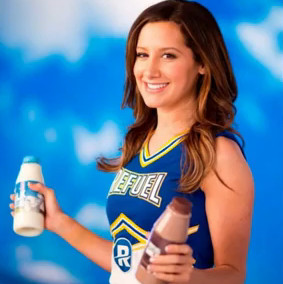Exercise makes the body conducive to absorb carbohydrates, to repair and restore damaged muscle glycogen, received through a post exercise drink/ meal.

Chocolate milk is the most preferred post exercise beverage with 1% or 2% milk which can be made fat free by adding chocolate syrup in skim milk, which provides carbohydrate and the required protein. It may be noted that though the calorie content differs by 1% in different brands (varying from 90 to 200 per 250 ml), the fat content remains the same. That is why chocolate milk is preferred among others to charge themselves after a workout at the gym.
Carbohydrate content
Taking chocolate milk immediately after lifting provides the needed carbohydrates, which vary with the brand, and most of them would be between 20 to 25 grams. The highest count of carbohydrate found, in 2% chocolate milk in Hershey, which is about 31 grams while Hood’s calorie is of 5 grams the lowest in count.
The sugar infuse glucose levels into the muscles and recharge energy for next practice; without which the recovery pace would be slower meaning more timeout from the gym.
A study on persons with three interval- model exhaustion sessions conducted by an International Journal of Sports has shown that the subjects took either chocolate milk or carbohydrate fluid for recovery after gym. Also, it was found that those who were taking chocolate milk after gym have given increased recovery and performance in interval sessions than those who had carbohydrate beverages
Protein content
Normally one would like to consume 15 to 25 grams of protein after gym; which would equate 500 to 750 ml of chocolate milk. A study conducted by an American Journal of Clinical Nutrition has assessed that milk based proteins are good in muscle protein synthesis than soy-based.
The other reason for preferring chocolate milk after work-out is because that cow’s milk contain 80% casein protein and 20% whey protein; wherein whey protein works faster to allow amino acids into muscle tissues, while casein protein digested at slower pace and provides a steady flow of amino acids over a longer period.
Calcium content
Taking chocolate milk preferred, because of its calcium content which is the “power stroke” mineral, works well at the time of muscle contraction. The calcium ions stimulate the power stroke without which the process would not be possible.
Taking Hershey’s chocolate milk after gym would increase the calcium level in body and provide the required power stroke, because of its 500 mg of calcium content in each cup, while it is between 300 to 400 mg in other brands.
Milk it
People turn to sugary Chocolate milk after gym, rather than burning their purses for beverages. Hot or chilled Chocolate milk is comforting, irrespective of time or age of person, but have to avoid excess of it to control fat and to remain healthy. Below shown are the nutrition facts and its effects.
The benefits of Drinking Chocolate Milk after a workout or otherwise
As seen chocolate milk have the nutrients of protein, calcium, and phosphorus. A recent health study research has shown the benefits of chocolate as under:
- As Chocolate milk is full of energy, it can be part of your breakfast; but balanced to avoid sluggishness, over weight.
- Recent study has shown that a glass of low fat chocolate milk , within 15 minutes after gym is the choice to get enough protein and to recoup the worn-out muscle cells
- Chocolate milk drink reduces the fatigue of work-out and helps to rush office.
- A glass of chocolate milk before bed would give good rest as the amino acid present in it relaxes the stress.
- The darker the chocolate milk, lesser the risk of getting cardiovascular as it has antioxidants to keep the immune system healthy.
- As commercial products have more sugar, it is better to have homemade chocolate milk; avoiding sugar, one glass a day at breakfast is enough to keep healthy, as excess would do harm.
Nutritional information for Chocolate Milk
Given below are the nutrition facts of 1 cup (250 grams) of chocolate milk (homemade), as per the USDA, where:
g = grams
mg = milligrams
mcg = micrograms
IU = International Units
| Nutrient | Value |
| Calories | 192 |
| Carbohydrate | 26.85 g |
| Sugars | 24.15 g |
| Lactose | 11.57 g |
| Protein | 8.8 g |
| Fat | 6 g |
| Calcium | 285 mg |
| Iron | 1.05 mg |
| Magnesium | 58 mg |
| Potassium | 492 mg |
| Phosphorus | 262 mg |
| Sodium | 110 mg |
| Fluoride | 7.8 mcg |
| Selenium | 6.8 mcg |
| Vitamin A | 440 IU |
| Vitamin C | 0.5 mg |
| Vitamin D | 100 IU |
| Vitamin B2 (Riboflavin) | 0.5 mg |
| Vitamin B1 (Thiamine) | 0.1 mg |
| Vitamin B12 | 1.1 mcg |
| Folate | 12.5 mcg |
| Cholesterol | 20 mg |